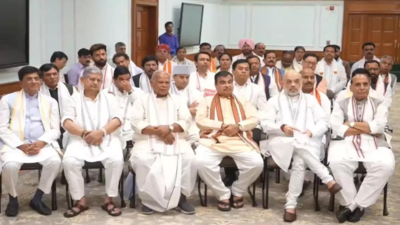Centre OKs 85% quota for locals in jobs in Ladakh | India News

NEW DELHI: Conceding the longstanding demands of Ladakhi people for safeguarding their economic rights as well as cultural and linguistic identity, the Centre on Tuesday introduced new reservation and domicile policy for the Union Territory, guaranteeing 85% quota to locals in jobs while also reserving one-third seats for women in the Ladakh Autonomous Hill Development Councils.English, Hindi, Urdu, Bhoti and Purgi languages were notified as official languages of Ladakh, with new regulation also requiring boosting institutional mechanisms for promoting native languages like Shina (Dardic), Brokskat (Dardic), Balti and Ladakhi.Ladakh Autonomous Council to reserve 33% of seats for women Centre’s move seeks to assuage the sentiments of Ladakh’s native population that had been demanding constitutional safeguards to protect their language, culture and land after the special status of the erstwhile state of J&K, which included Ladakh, under Article 370 was abrogated in 2019, and Ladakh hived off into a separate Union Territory. Though short of their demand for Ladakh’s inclusion in Sixth Schedule of the Constitution, the 85% reservation for local Ladakhis in govt jobs and seats in professional institutions, was worked out in consultations held by a high-powered committee led by junior home minister Nityanand Rai, with civil society organisations from Ladakh.The safeguards for Ladakh finally implemented on Tuesday, are contained in a set of three separate regulations promulgated by the President of India on Monday. The UT of Ladakh Reservation (Amendment) Bill Regulation, 2025 amends provisions of the parent J&K Reservation Act, 2004, to raise the cap on total reservation in jobs and professional institutions in Ladakh to 85%, excluding the 10% quota for economically weaker sections.The Ladakh Civil Services Decentralisation and Recruitment (Amendment) Regulation, 2025, defines the conditions for domicile status: anyone who has resided in Ladakh for 15 years, or who has studied for seven years and appeared in Class 10 or 12 examination in a school located in UT, or whose parents are central govt officers who served in UT for 10 years. Children or spouses of Ladakhis fulfilling the 15-year domicile condition will also get domicile status. The procedure for grant of domicile certificate, notified in a separate set of rules, makes tehsildar the competent authority to issue domicile certificates; an officer appointed by the UT administrator will do the same for the children of central govt officers with 10-year service in Ladakh.The Ladakh Autonomous Hill Development Councils (LAHDC) Regulation 2025, notified on Tuesday, states that “not less than one-third of the total number of seats in the council shall be reserved for women and such seats may be allotted by rotation to different territorial constituencies”. The move is in line with spirit of the Nari Shakti Vandan Act, which provides for 33% quota to women in Lok Sabha and state assemblies.Ladakh has two autonomous hill development councils – one each for Leh and Kargil.Centre had assured a delegation from Ladakh in Dec 2023 that it was committed to fast-tracking the development of UT and meeting aspirations of the people in the region. Subsequently, an HPC for Ladakh was constituted under Nityanand Rai. In Aug 2024, Centre created five new districts in Ladakh – Zanskar, Drass, Sham, Nubra and Changthang.





